Corporate Governance Practices: Depreciation Method Change
VerifiedAdded on 2020/05/28
|10
|2538
|58
Report
AI Summary
This report provides an in-depth analysis of Sunshine Ltd.'s decision to change its depreciation method from the straight-line method to the sum-of-years' digits method. The change was implemented to present consistent profits, potentially misleading shareholders. The report examines the implications of this decision on corporate governance, business ethics, and accounting standards. It highlights the ethical dilemma faced by the accountant, Maria Mars, and discusses the importance of accurate financial reporting for stakeholders. The report emphasizes that the change in the depreciation method is not justified and goes against the principles of corporate governance. The report concludes that the accountant should prioritize the interests of the shareholders and make adequate disclosures, including the reasons for the change, to ensure transparency and ethical practices. The report further discusses the importance of adhering to AASB 116 and the consistent application of depreciation methods.
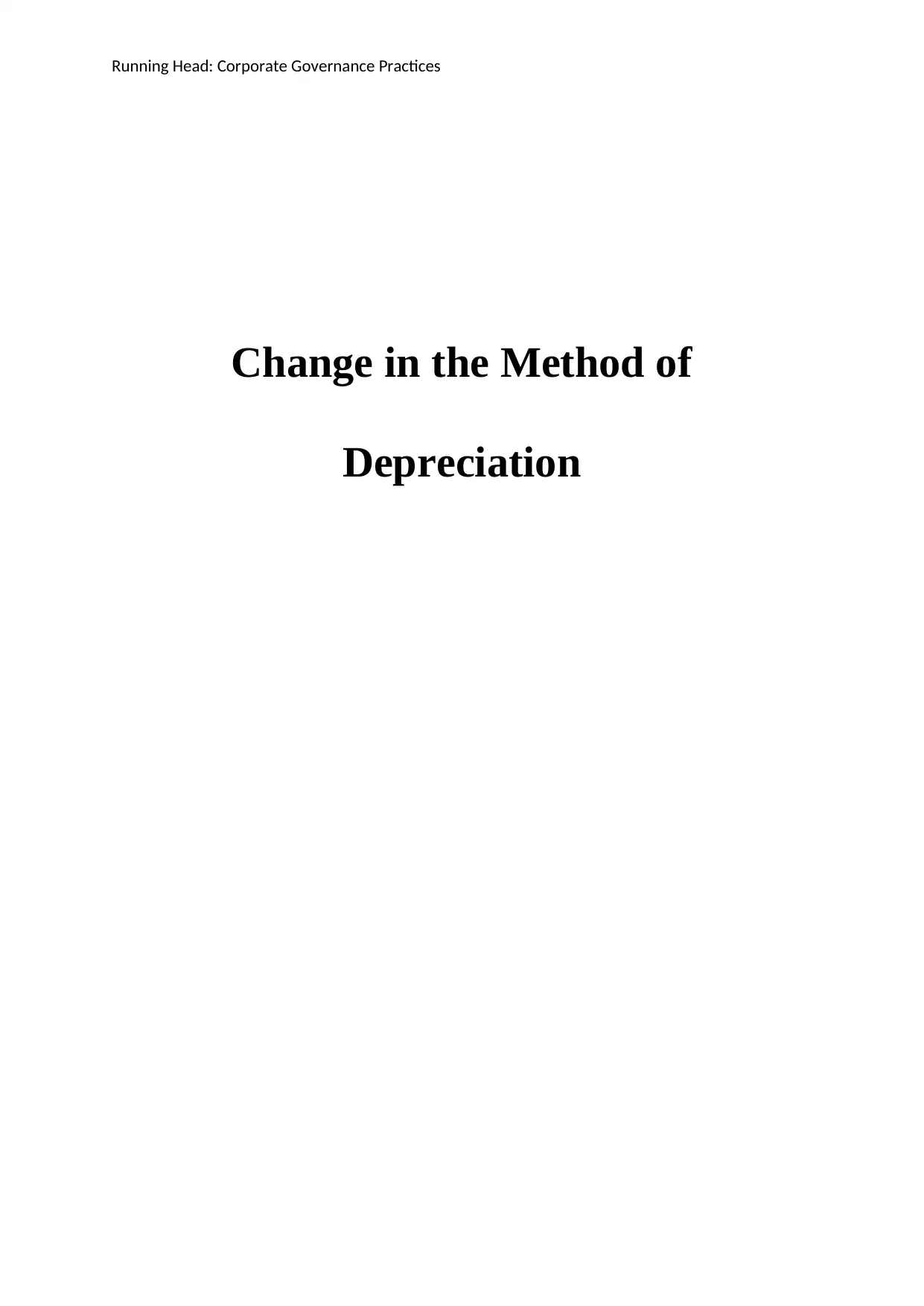
Running Head: Corporate Governance Practices
Change in the Method of
Depreciation
Change in the Method of
Depreciation
Paraphrase This Document
Need a fresh take? Get an instant paraphrase of this document with our AI Paraphraser
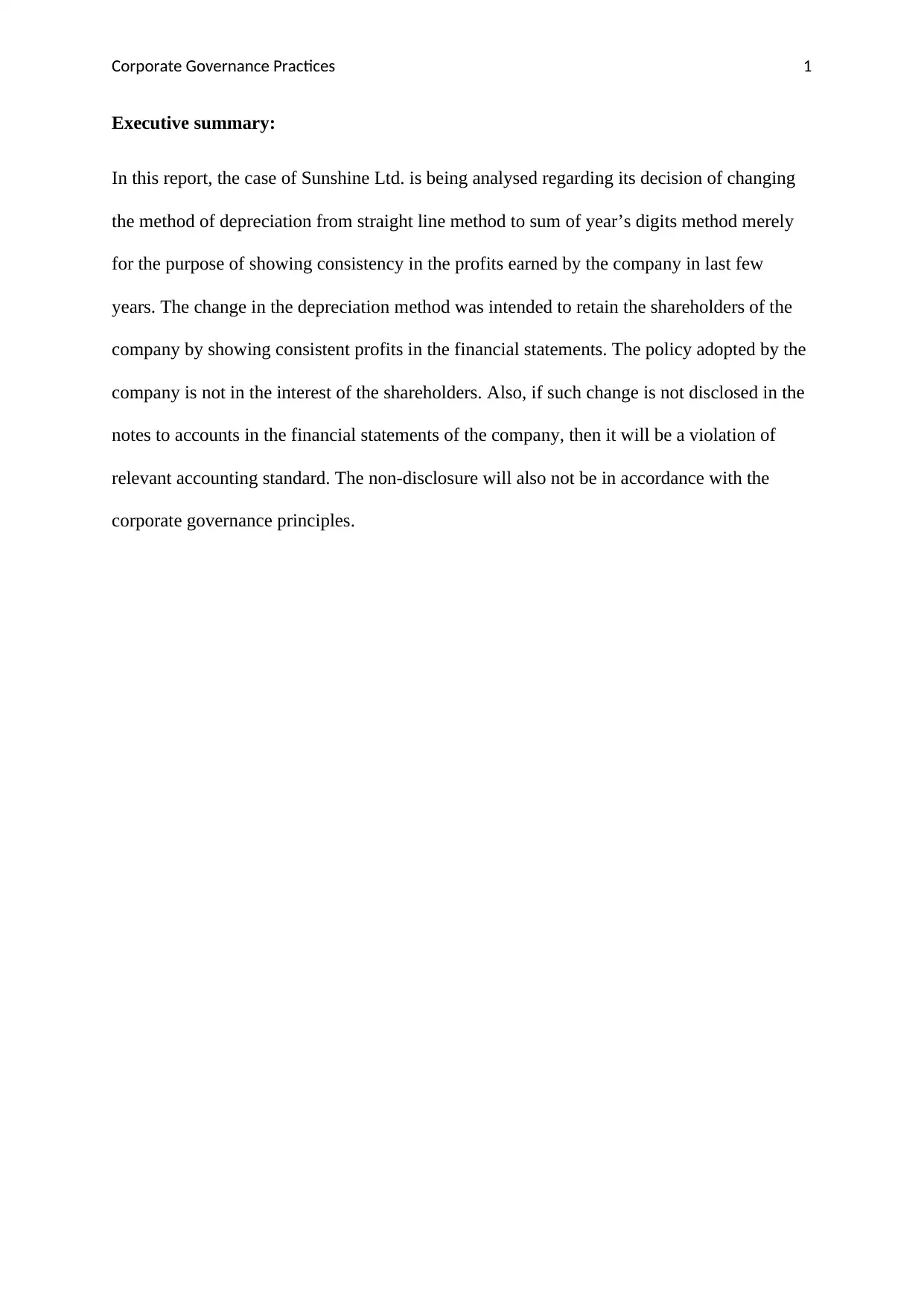
Corporate Governance Practices 1
Executive summary:
In this report, the case of Sunshine Ltd. is being analysed regarding its decision of changing
the method of depreciation from straight line method to sum of year’s digits method merely
for the purpose of showing consistency in the profits earned by the company in last few
years. The change in the depreciation method was intended to retain the shareholders of the
company by showing consistent profits in the financial statements. The policy adopted by the
company is not in the interest of the shareholders. Also, if such change is not disclosed in the
notes to accounts in the financial statements of the company, then it will be a violation of
relevant accounting standard. The non-disclosure will also not be in accordance with the
corporate governance principles.
Executive summary:
In this report, the case of Sunshine Ltd. is being analysed regarding its decision of changing
the method of depreciation from straight line method to sum of year’s digits method merely
for the purpose of showing consistency in the profits earned by the company in last few
years. The change in the depreciation method was intended to retain the shareholders of the
company by showing consistent profits in the financial statements. The policy adopted by the
company is not in the interest of the shareholders. Also, if such change is not disclosed in the
notes to accounts in the financial statements of the company, then it will be a violation of
relevant accounting standard. The non-disclosure will also not be in accordance with the
corporate governance principles.
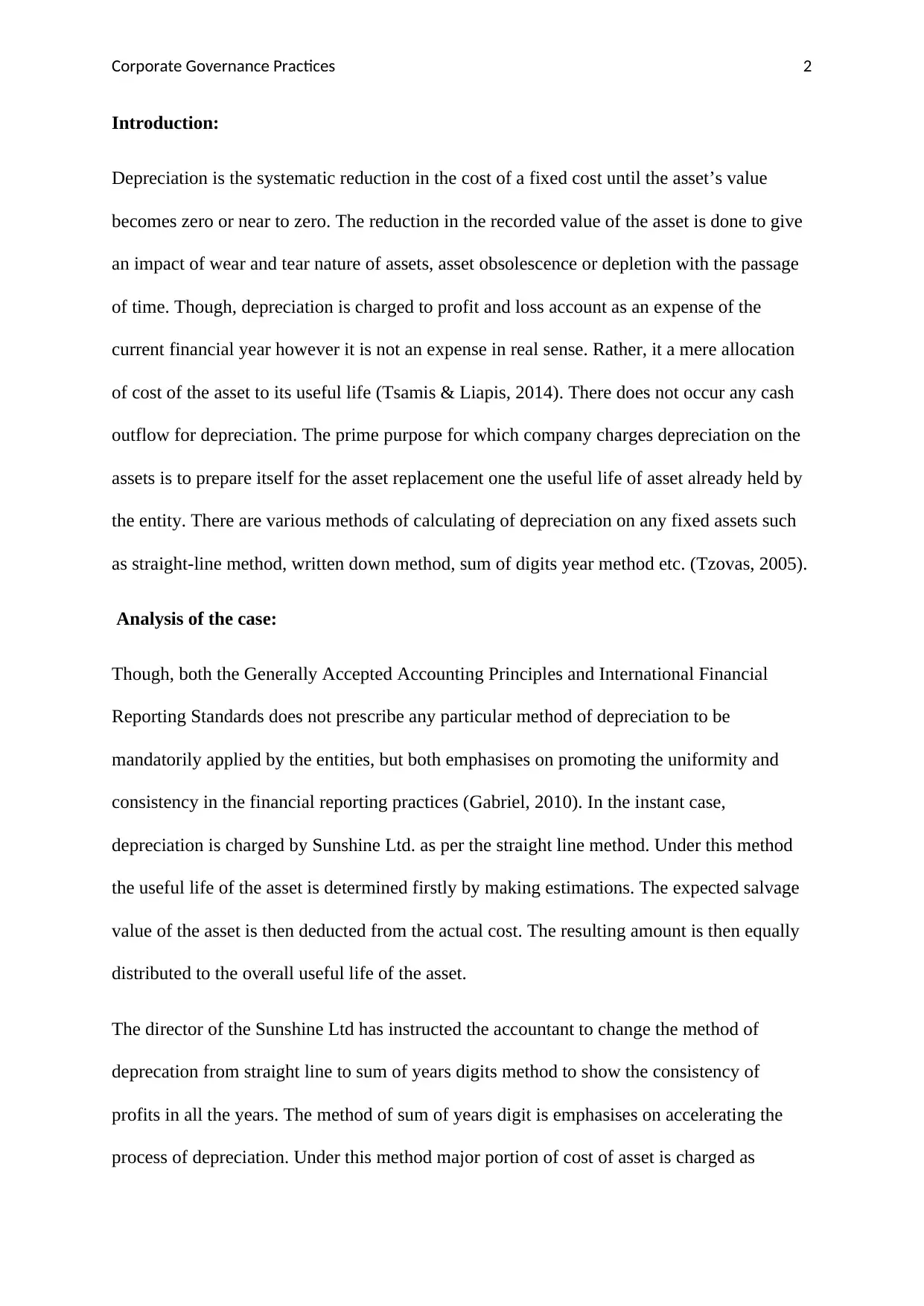
Corporate Governance Practices 2
Introduction:
Depreciation is the systematic reduction in the cost of a fixed cost until the asset’s value
becomes zero or near to zero. The reduction in the recorded value of the asset is done to give
an impact of wear and tear nature of assets, asset obsolescence or depletion with the passage
of time. Though, depreciation is charged to profit and loss account as an expense of the
current financial year however it is not an expense in real sense. Rather, it a mere allocation
of cost of the asset to its useful life (Tsamis & Liapis, 2014). There does not occur any cash
outflow for depreciation. The prime purpose for which company charges depreciation on the
assets is to prepare itself for the asset replacement one the useful life of asset already held by
the entity. There are various methods of calculating of depreciation on any fixed assets such
as straight-line method, written down method, sum of digits year method etc. (Tzovas, 2005).
Analysis of the case:
Though, both the Generally Accepted Accounting Principles and International Financial
Reporting Standards does not prescribe any particular method of depreciation to be
mandatorily applied by the entities, but both emphasises on promoting the uniformity and
consistency in the financial reporting practices (Gabriel, 2010). In the instant case,
depreciation is charged by Sunshine Ltd. as per the straight line method. Under this method
the useful life of the asset is determined firstly by making estimations. The expected salvage
value of the asset is then deducted from the actual cost. The resulting amount is then equally
distributed to the overall useful life of the asset.
The director of the Sunshine Ltd has instructed the accountant to change the method of
deprecation from straight line to sum of years digits method to show the consistency of
profits in all the years. The method of sum of years digit is emphasises on accelerating the
process of depreciation. Under this method major portion of cost of asset is charged as
Introduction:
Depreciation is the systematic reduction in the cost of a fixed cost until the asset’s value
becomes zero or near to zero. The reduction in the recorded value of the asset is done to give
an impact of wear and tear nature of assets, asset obsolescence or depletion with the passage
of time. Though, depreciation is charged to profit and loss account as an expense of the
current financial year however it is not an expense in real sense. Rather, it a mere allocation
of cost of the asset to its useful life (Tsamis & Liapis, 2014). There does not occur any cash
outflow for depreciation. The prime purpose for which company charges depreciation on the
assets is to prepare itself for the asset replacement one the useful life of asset already held by
the entity. There are various methods of calculating of depreciation on any fixed assets such
as straight-line method, written down method, sum of digits year method etc. (Tzovas, 2005).
Analysis of the case:
Though, both the Generally Accepted Accounting Principles and International Financial
Reporting Standards does not prescribe any particular method of depreciation to be
mandatorily applied by the entities, but both emphasises on promoting the uniformity and
consistency in the financial reporting practices (Gabriel, 2010). In the instant case,
depreciation is charged by Sunshine Ltd. as per the straight line method. Under this method
the useful life of the asset is determined firstly by making estimations. The expected salvage
value of the asset is then deducted from the actual cost. The resulting amount is then equally
distributed to the overall useful life of the asset.
The director of the Sunshine Ltd has instructed the accountant to change the method of
deprecation from straight line to sum of years digits method to show the consistency of
profits in all the years. The method of sum of years digit is emphasises on accelerating the
process of depreciation. Under this method major portion of cost of asset is charged as
⊘ This is a preview!⊘
Do you want full access?
Subscribe today to unlock all pages.

Trusted by 1+ million students worldwide
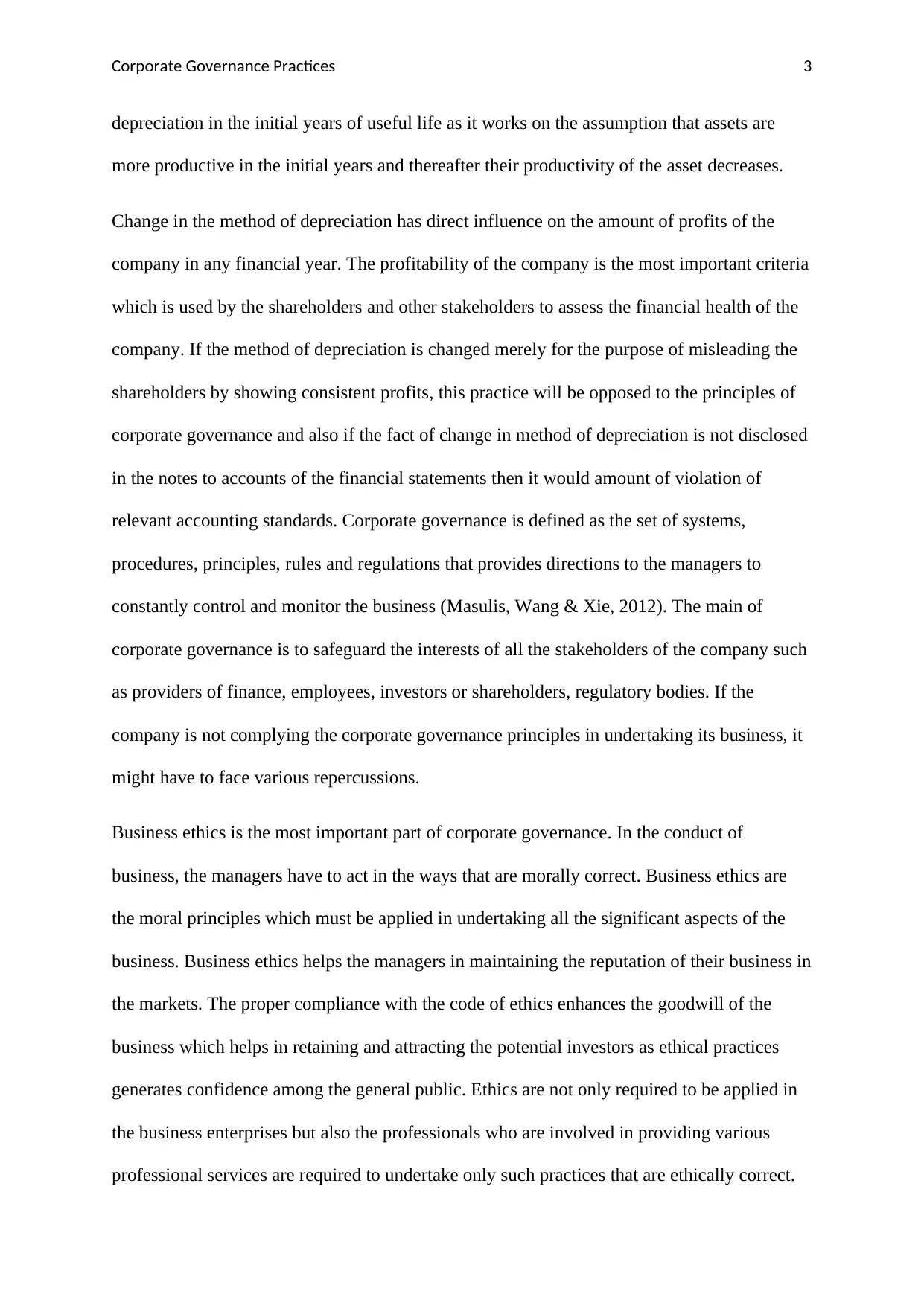
Corporate Governance Practices 3
depreciation in the initial years of useful life as it works on the assumption that assets are
more productive in the initial years and thereafter their productivity of the asset decreases.
Change in the method of depreciation has direct influence on the amount of profits of the
company in any financial year. The profitability of the company is the most important criteria
which is used by the shareholders and other stakeholders to assess the financial health of the
company. If the method of depreciation is changed merely for the purpose of misleading the
shareholders by showing consistent profits, this practice will be opposed to the principles of
corporate governance and also if the fact of change in method of depreciation is not disclosed
in the notes to accounts of the financial statements then it would amount of violation of
relevant accounting standards. Corporate governance is defined as the set of systems,
procedures, principles, rules and regulations that provides directions to the managers to
constantly control and monitor the business (Masulis, Wang & Xie, 2012). The main of
corporate governance is to safeguard the interests of all the stakeholders of the company such
as providers of finance, employees, investors or shareholders, regulatory bodies. If the
company is not complying the corporate governance principles in undertaking its business, it
might have to face various repercussions.
Business ethics is the most important part of corporate governance. In the conduct of
business, the managers have to act in the ways that are morally correct. Business ethics are
the moral principles which must be applied in undertaking all the significant aspects of the
business. Business ethics helps the managers in maintaining the reputation of their business in
the markets. The proper compliance with the code of ethics enhances the goodwill of the
business which helps in retaining and attracting the potential investors as ethical practices
generates confidence among the general public. Ethics are not only required to be applied in
the business enterprises but also the professionals who are involved in providing various
professional services are required to undertake only such practices that are ethically correct.
depreciation in the initial years of useful life as it works on the assumption that assets are
more productive in the initial years and thereafter their productivity of the asset decreases.
Change in the method of depreciation has direct influence on the amount of profits of the
company in any financial year. The profitability of the company is the most important criteria
which is used by the shareholders and other stakeholders to assess the financial health of the
company. If the method of depreciation is changed merely for the purpose of misleading the
shareholders by showing consistent profits, this practice will be opposed to the principles of
corporate governance and also if the fact of change in method of depreciation is not disclosed
in the notes to accounts of the financial statements then it would amount of violation of
relevant accounting standards. Corporate governance is defined as the set of systems,
procedures, principles, rules and regulations that provides directions to the managers to
constantly control and monitor the business (Masulis, Wang & Xie, 2012). The main of
corporate governance is to safeguard the interests of all the stakeholders of the company such
as providers of finance, employees, investors or shareholders, regulatory bodies. If the
company is not complying the corporate governance principles in undertaking its business, it
might have to face various repercussions.
Business ethics is the most important part of corporate governance. In the conduct of
business, the managers have to act in the ways that are morally correct. Business ethics are
the moral principles which must be applied in undertaking all the significant aspects of the
business. Business ethics helps the managers in maintaining the reputation of their business in
the markets. The proper compliance with the code of ethics enhances the goodwill of the
business which helps in retaining and attracting the potential investors as ethical practices
generates confidence among the general public. Ethics are not only required to be applied in
the business enterprises but also the professionals who are involved in providing various
professional services are required to undertake only such practices that are ethically correct.
Paraphrase This Document
Need a fresh take? Get an instant paraphrase of this document with our AI Paraphraser
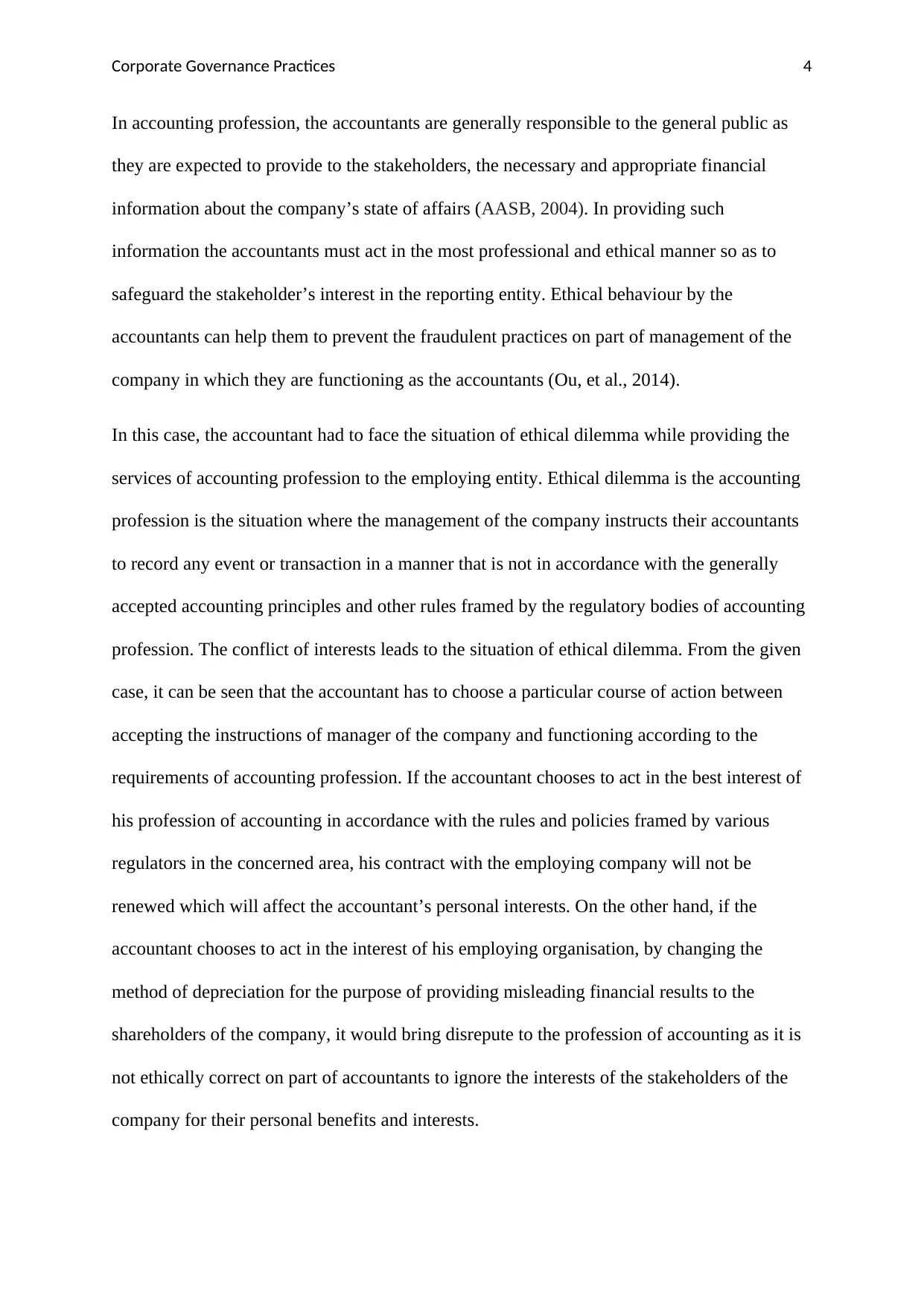
Corporate Governance Practices 4
In accounting profession, the accountants are generally responsible to the general public as
they are expected to provide to the stakeholders, the necessary and appropriate financial
information about the company’s state of affairs (AASB, 2004). In providing such
information the accountants must act in the most professional and ethical manner so as to
safeguard the stakeholder’s interest in the reporting entity. Ethical behaviour by the
accountants can help them to prevent the fraudulent practices on part of management of the
company in which they are functioning as the accountants (Ou, et al., 2014).
In this case, the accountant had to face the situation of ethical dilemma while providing the
services of accounting profession to the employing entity. Ethical dilemma is the accounting
profession is the situation where the management of the company instructs their accountants
to record any event or transaction in a manner that is not in accordance with the generally
accepted accounting principles and other rules framed by the regulatory bodies of accounting
profession. The conflict of interests leads to the situation of ethical dilemma. From the given
case, it can be seen that the accountant has to choose a particular course of action between
accepting the instructions of manager of the company and functioning according to the
requirements of accounting profession. If the accountant chooses to act in the best interest of
his profession of accounting in accordance with the rules and policies framed by various
regulators in the concerned area, his contract with the employing company will not be
renewed which will affect the accountant’s personal interests. On the other hand, if the
accountant chooses to act in the interest of his employing organisation, by changing the
method of depreciation for the purpose of providing misleading financial results to the
shareholders of the company, it would bring disrepute to the profession of accounting as it is
not ethically correct on part of accountants to ignore the interests of the stakeholders of the
company for their personal benefits and interests.
In accounting profession, the accountants are generally responsible to the general public as
they are expected to provide to the stakeholders, the necessary and appropriate financial
information about the company’s state of affairs (AASB, 2004). In providing such
information the accountants must act in the most professional and ethical manner so as to
safeguard the stakeholder’s interest in the reporting entity. Ethical behaviour by the
accountants can help them to prevent the fraudulent practices on part of management of the
company in which they are functioning as the accountants (Ou, et al., 2014).
In this case, the accountant had to face the situation of ethical dilemma while providing the
services of accounting profession to the employing entity. Ethical dilemma is the accounting
profession is the situation where the management of the company instructs their accountants
to record any event or transaction in a manner that is not in accordance with the generally
accepted accounting principles and other rules framed by the regulatory bodies of accounting
profession. The conflict of interests leads to the situation of ethical dilemma. From the given
case, it can be seen that the accountant has to choose a particular course of action between
accepting the instructions of manager of the company and functioning according to the
requirements of accounting profession. If the accountant chooses to act in the best interest of
his profession of accounting in accordance with the rules and policies framed by various
regulators in the concerned area, his contract with the employing company will not be
renewed which will affect the accountant’s personal interests. On the other hand, if the
accountant chooses to act in the interest of his employing organisation, by changing the
method of depreciation for the purpose of providing misleading financial results to the
shareholders of the company, it would bring disrepute to the profession of accounting as it is
not ethically correct on part of accountants to ignore the interests of the stakeholders of the
company for their personal benefits and interests.
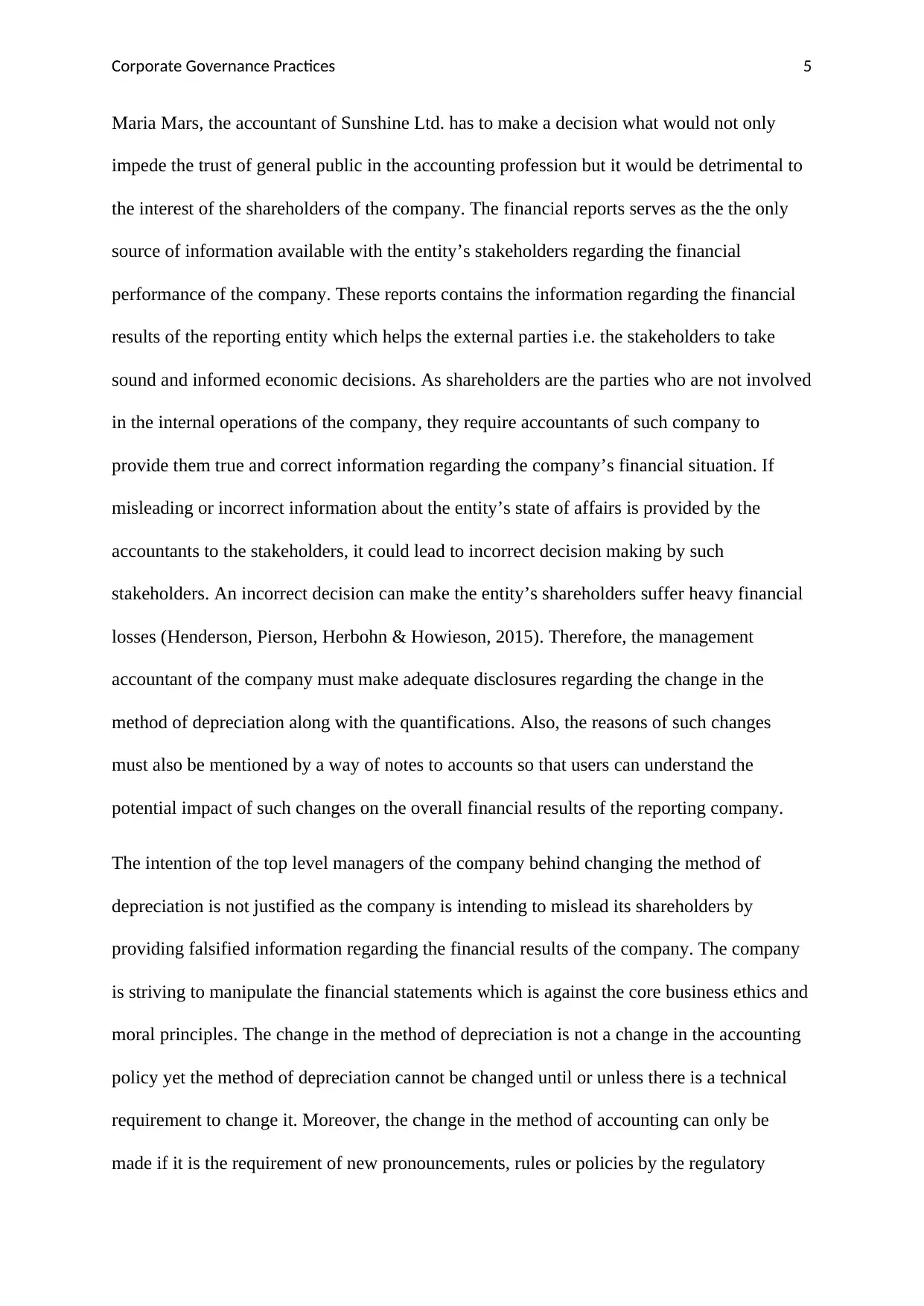
Corporate Governance Practices 5
Maria Mars, the accountant of Sunshine Ltd. has to make a decision what would not only
impede the trust of general public in the accounting profession but it would be detrimental to
the interest of the shareholders of the company. The financial reports serves as the the only
source of information available with the entity’s stakeholders regarding the financial
performance of the company. These reports contains the information regarding the financial
results of the reporting entity which helps the external parties i.e. the stakeholders to take
sound and informed economic decisions. As shareholders are the parties who are not involved
in the internal operations of the company, they require accountants of such company to
provide them true and correct information regarding the company’s financial situation. If
misleading or incorrect information about the entity’s state of affairs is provided by the
accountants to the stakeholders, it could lead to incorrect decision making by such
stakeholders. An incorrect decision can make the entity’s shareholders suffer heavy financial
losses (Henderson, Pierson, Herbohn & Howieson, 2015). Therefore, the management
accountant of the company must make adequate disclosures regarding the change in the
method of depreciation along with the quantifications. Also, the reasons of such changes
must also be mentioned by a way of notes to accounts so that users can understand the
potential impact of such changes on the overall financial results of the reporting company.
The intention of the top level managers of the company behind changing the method of
depreciation is not justified as the company is intending to mislead its shareholders by
providing falsified information regarding the financial results of the company. The company
is striving to manipulate the financial statements which is against the core business ethics and
moral principles. The change in the method of depreciation is not a change in the accounting
policy yet the method of depreciation cannot be changed until or unless there is a technical
requirement to change it. Moreover, the change in the method of accounting can only be
made if it is the requirement of new pronouncements, rules or policies by the regulatory
Maria Mars, the accountant of Sunshine Ltd. has to make a decision what would not only
impede the trust of general public in the accounting profession but it would be detrimental to
the interest of the shareholders of the company. The financial reports serves as the the only
source of information available with the entity’s stakeholders regarding the financial
performance of the company. These reports contains the information regarding the financial
results of the reporting entity which helps the external parties i.e. the stakeholders to take
sound and informed economic decisions. As shareholders are the parties who are not involved
in the internal operations of the company, they require accountants of such company to
provide them true and correct information regarding the company’s financial situation. If
misleading or incorrect information about the entity’s state of affairs is provided by the
accountants to the stakeholders, it could lead to incorrect decision making by such
stakeholders. An incorrect decision can make the entity’s shareholders suffer heavy financial
losses (Henderson, Pierson, Herbohn & Howieson, 2015). Therefore, the management
accountant of the company must make adequate disclosures regarding the change in the
method of depreciation along with the quantifications. Also, the reasons of such changes
must also be mentioned by a way of notes to accounts so that users can understand the
potential impact of such changes on the overall financial results of the reporting company.
The intention of the top level managers of the company behind changing the method of
depreciation is not justified as the company is intending to mislead its shareholders by
providing falsified information regarding the financial results of the company. The company
is striving to manipulate the financial statements which is against the core business ethics and
moral principles. The change in the method of depreciation is not a change in the accounting
policy yet the method of depreciation cannot be changed until or unless there is a technical
requirement to change it. Moreover, the change in the method of accounting can only be
made if it is the requirement of new pronouncements, rules or policies by the regulatory
⊘ This is a preview!⊘
Do you want full access?
Subscribe today to unlock all pages.

Trusted by 1+ million students worldwide
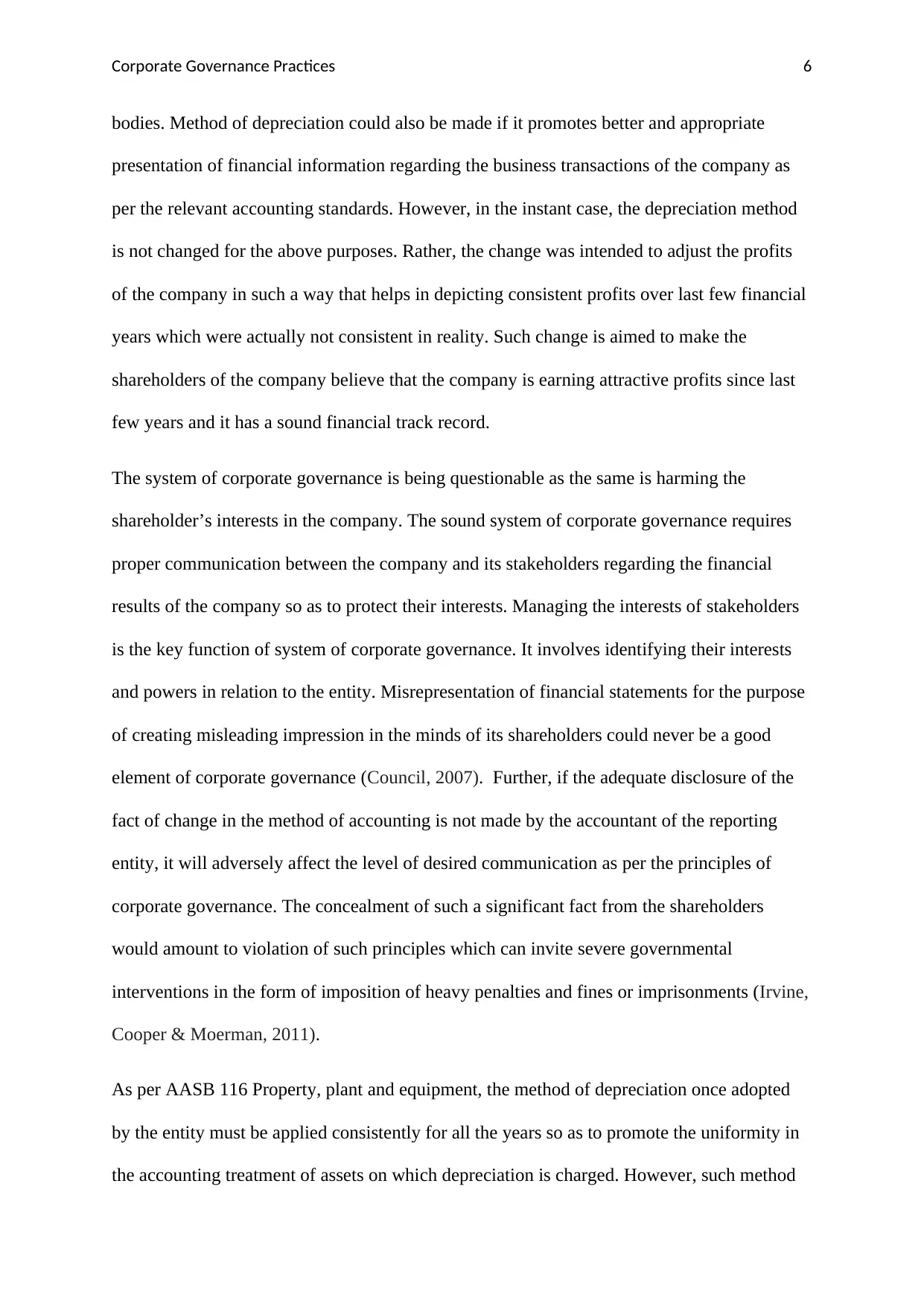
Corporate Governance Practices 6
bodies. Method of depreciation could also be made if it promotes better and appropriate
presentation of financial information regarding the business transactions of the company as
per the relevant accounting standards. However, in the instant case, the depreciation method
is not changed for the above purposes. Rather, the change was intended to adjust the profits
of the company in such a way that helps in depicting consistent profits over last few financial
years which were actually not consistent in reality. Such change is aimed to make the
shareholders of the company believe that the company is earning attractive profits since last
few years and it has a sound financial track record.
The system of corporate governance is being questionable as the same is harming the
shareholder’s interests in the company. The sound system of corporate governance requires
proper communication between the company and its stakeholders regarding the financial
results of the company so as to protect their interests. Managing the interests of stakeholders
is the key function of system of corporate governance. It involves identifying their interests
and powers in relation to the entity. Misrepresentation of financial statements for the purpose
of creating misleading impression in the minds of its shareholders could never be a good
element of corporate governance (Council, 2007). Further, if the adequate disclosure of the
fact of change in the method of accounting is not made by the accountant of the reporting
entity, it will adversely affect the level of desired communication as per the principles of
corporate governance. The concealment of such a significant fact from the shareholders
would amount to violation of such principles which can invite severe governmental
interventions in the form of imposition of heavy penalties and fines or imprisonments (Irvine,
Cooper & Moerman, 2011).
As per AASB 116 Property, plant and equipment, the method of depreciation once adopted
by the entity must be applied consistently for all the years so as to promote the uniformity in
the accounting treatment of assets on which depreciation is charged. However, such method
bodies. Method of depreciation could also be made if it promotes better and appropriate
presentation of financial information regarding the business transactions of the company as
per the relevant accounting standards. However, in the instant case, the depreciation method
is not changed for the above purposes. Rather, the change was intended to adjust the profits
of the company in such a way that helps in depicting consistent profits over last few financial
years which were actually not consistent in reality. Such change is aimed to make the
shareholders of the company believe that the company is earning attractive profits since last
few years and it has a sound financial track record.
The system of corporate governance is being questionable as the same is harming the
shareholder’s interests in the company. The sound system of corporate governance requires
proper communication between the company and its stakeholders regarding the financial
results of the company so as to protect their interests. Managing the interests of stakeholders
is the key function of system of corporate governance. It involves identifying their interests
and powers in relation to the entity. Misrepresentation of financial statements for the purpose
of creating misleading impression in the minds of its shareholders could never be a good
element of corporate governance (Council, 2007). Further, if the adequate disclosure of the
fact of change in the method of accounting is not made by the accountant of the reporting
entity, it will adversely affect the level of desired communication as per the principles of
corporate governance. The concealment of such a significant fact from the shareholders
would amount to violation of such principles which can invite severe governmental
interventions in the form of imposition of heavy penalties and fines or imprisonments (Irvine,
Cooper & Moerman, 2011).
As per AASB 116 Property, plant and equipment, the method of depreciation once adopted
by the entity must be applied consistently for all the years so as to promote the uniformity in
the accounting treatment of assets on which depreciation is charged. However, such method
Paraphrase This Document
Need a fresh take? Get an instant paraphrase of this document with our AI Paraphraser
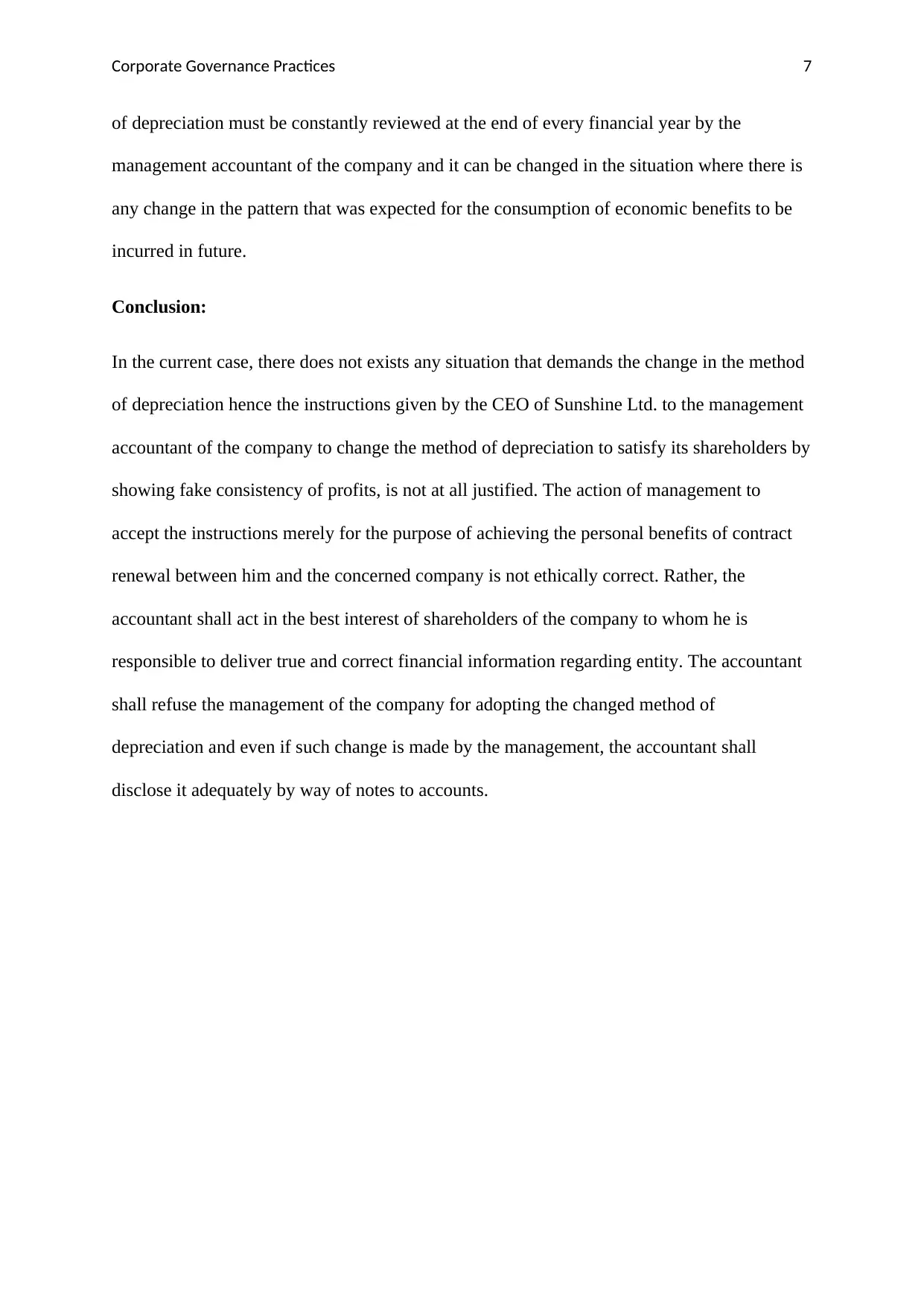
Corporate Governance Practices 7
of depreciation must be constantly reviewed at the end of every financial year by the
management accountant of the company and it can be changed in the situation where there is
any change in the pattern that was expected for the consumption of economic benefits to be
incurred in future.
Conclusion:
In the current case, there does not exists any situation that demands the change in the method
of depreciation hence the instructions given by the CEO of Sunshine Ltd. to the management
accountant of the company to change the method of depreciation to satisfy its shareholders by
showing fake consistency of profits, is not at all justified. The action of management to
accept the instructions merely for the purpose of achieving the personal benefits of contract
renewal between him and the concerned company is not ethically correct. Rather, the
accountant shall act in the best interest of shareholders of the company to whom he is
responsible to deliver true and correct financial information regarding entity. The accountant
shall refuse the management of the company for adopting the changed method of
depreciation and even if such change is made by the management, the accountant shall
disclose it adequately by way of notes to accounts.
of depreciation must be constantly reviewed at the end of every financial year by the
management accountant of the company and it can be changed in the situation where there is
any change in the pattern that was expected for the consumption of economic benefits to be
incurred in future.
Conclusion:
In the current case, there does not exists any situation that demands the change in the method
of depreciation hence the instructions given by the CEO of Sunshine Ltd. to the management
accountant of the company to change the method of depreciation to satisfy its shareholders by
showing fake consistency of profits, is not at all justified. The action of management to
accept the instructions merely for the purpose of achieving the personal benefits of contract
renewal between him and the concerned company is not ethically correct. Rather, the
accountant shall act in the best interest of shareholders of the company to whom he is
responsible to deliver true and correct financial information regarding entity. The accountant
shall refuse the management of the company for adopting the changed method of
depreciation and even if such change is made by the management, the accountant shall
disclose it adequately by way of notes to accounts.
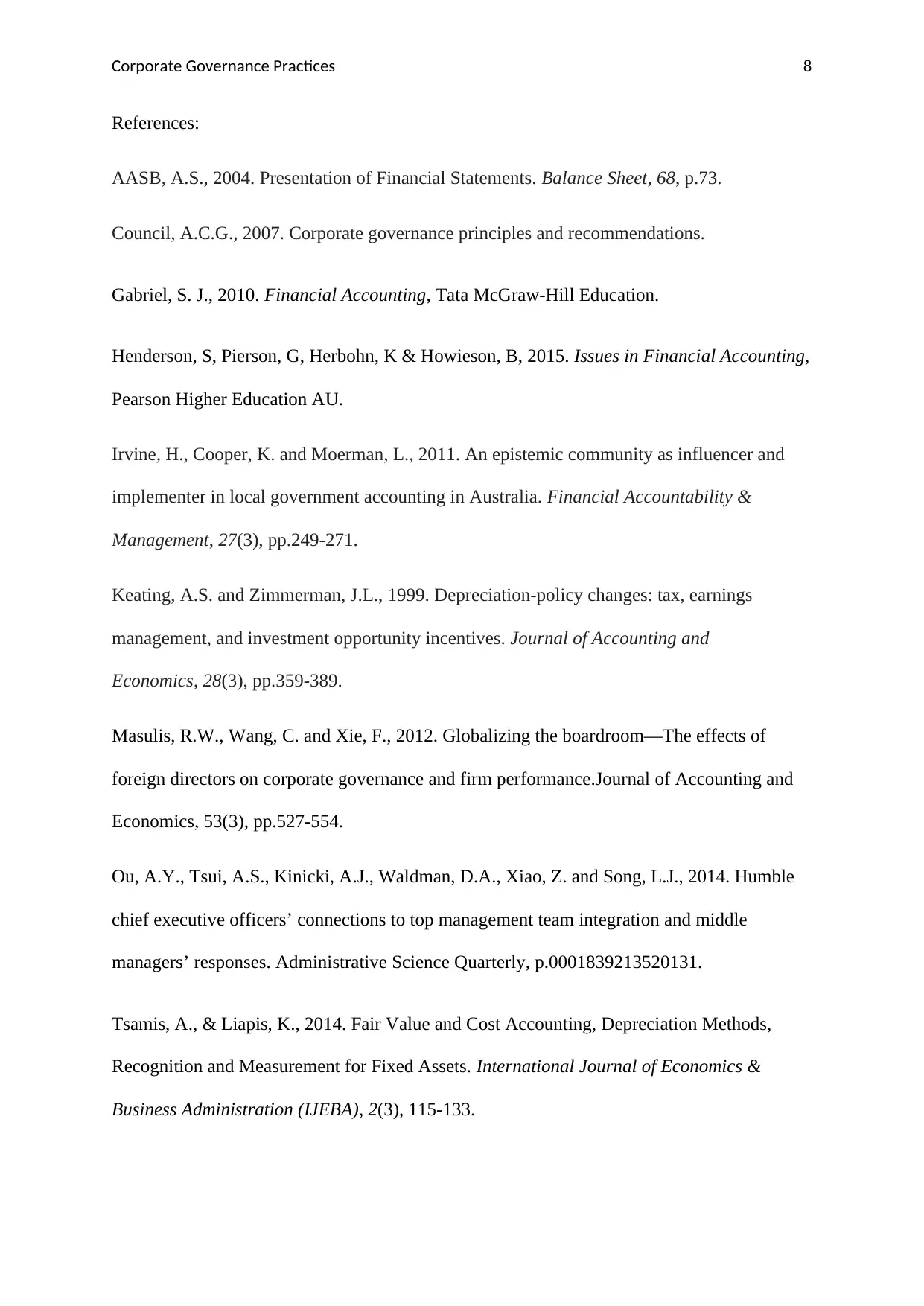
Corporate Governance Practices 8
References:
AASB, A.S., 2004. Presentation of Financial Statements. Balance Sheet, 68, p.73.
Council, A.C.G., 2007. Corporate governance principles and recommendations.
Gabriel, S. J., 2010. Financial Accounting, Tata McGraw-Hill Education.
Henderson, S, Pierson, G, Herbohn, K & Howieson, B, 2015. Issues in Financial Accounting,
Pearson Higher Education AU.
Irvine, H., Cooper, K. and Moerman, L., 2011. An epistemic community as influencer and
implementer in local government accounting in Australia. Financial Accountability &
Management, 27(3), pp.249-271.
Keating, A.S. and Zimmerman, J.L., 1999. Depreciation-policy changes: tax, earnings
management, and investment opportunity incentives. Journal of Accounting and
Economics, 28(3), pp.359-389.
Masulis, R.W., Wang, C. and Xie, F., 2012. Globalizing the boardroom—The effects of
foreign directors on corporate governance and firm performance.Journal of Accounting and
Economics, 53(3), pp.527-554.
Ou, A.Y., Tsui, A.S., Kinicki, A.J., Waldman, D.A., Xiao, Z. and Song, L.J., 2014. Humble
chief executive officers’ connections to top management team integration and middle
managers’ responses. Administrative Science Quarterly, p.0001839213520131.
Tsamis, A., & Liapis, K., 2014. Fair Value and Cost Accounting, Depreciation Methods,
Recognition and Measurement for Fixed Assets. International Journal of Economics &
Business Administration (IJEBA), 2(3), 115-133.
References:
AASB, A.S., 2004. Presentation of Financial Statements. Balance Sheet, 68, p.73.
Council, A.C.G., 2007. Corporate governance principles and recommendations.
Gabriel, S. J., 2010. Financial Accounting, Tata McGraw-Hill Education.
Henderson, S, Pierson, G, Herbohn, K & Howieson, B, 2015. Issues in Financial Accounting,
Pearson Higher Education AU.
Irvine, H., Cooper, K. and Moerman, L., 2011. An epistemic community as influencer and
implementer in local government accounting in Australia. Financial Accountability &
Management, 27(3), pp.249-271.
Keating, A.S. and Zimmerman, J.L., 1999. Depreciation-policy changes: tax, earnings
management, and investment opportunity incentives. Journal of Accounting and
Economics, 28(3), pp.359-389.
Masulis, R.W., Wang, C. and Xie, F., 2012. Globalizing the boardroom—The effects of
foreign directors on corporate governance and firm performance.Journal of Accounting and
Economics, 53(3), pp.527-554.
Ou, A.Y., Tsui, A.S., Kinicki, A.J., Waldman, D.A., Xiao, Z. and Song, L.J., 2014. Humble
chief executive officers’ connections to top management team integration and middle
managers’ responses. Administrative Science Quarterly, p.0001839213520131.
Tsamis, A., & Liapis, K., 2014. Fair Value and Cost Accounting, Depreciation Methods,
Recognition and Measurement for Fixed Assets. International Journal of Economics &
Business Administration (IJEBA), 2(3), 115-133.
⊘ This is a preview!⊘
Do you want full access?
Subscribe today to unlock all pages.

Trusted by 1+ million students worldwide
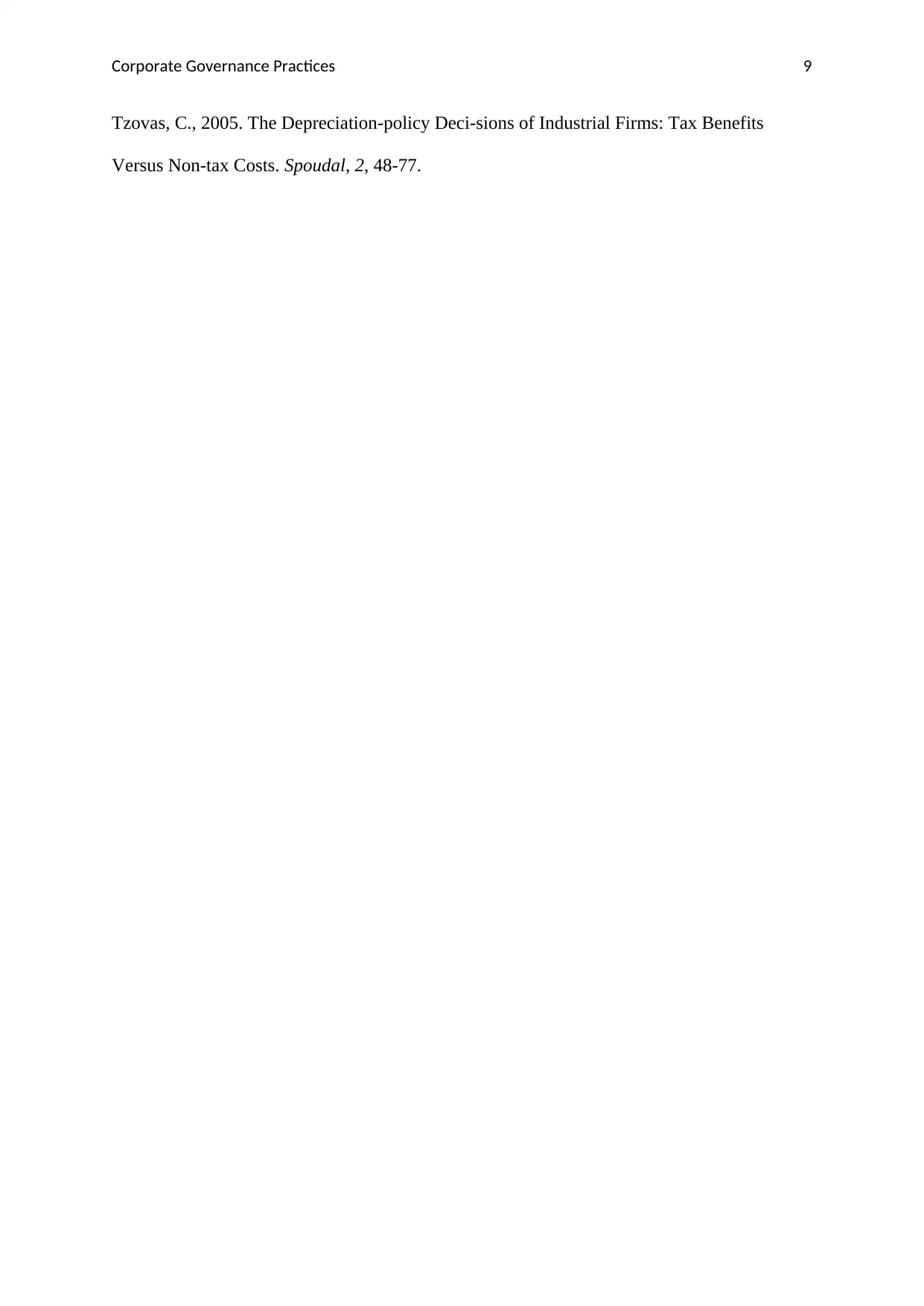
Corporate Governance Practices 9
Tzovas, C., 2005. The Depreciation-policy Deci-sions of Industrial Firms: Tax Benefits
Versus Non-tax Costs. Spoudal, 2, 48-77.
Tzovas, C., 2005. The Depreciation-policy Deci-sions of Industrial Firms: Tax Benefits
Versus Non-tax Costs. Spoudal, 2, 48-77.
1 out of 10
Related Documents
Your All-in-One AI-Powered Toolkit for Academic Success.
+13062052269
info@desklib.com
Available 24*7 on WhatsApp / Email
![[object Object]](/_next/static/media/star-bottom.7253800d.svg)
Unlock your academic potential
Copyright © 2020–2025 A2Z Services. All Rights Reserved. Developed and managed by ZUCOL.





